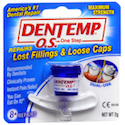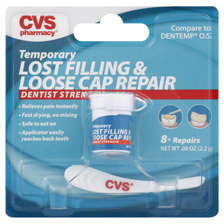 Though not normally life-threatening, we all know that toothaches and pains in the mouth can be some of the most excruciating to bear simply because we use our mouths for everything. Talking, eating, and drinking feel next to impossible when your mouth hurts, so here we are going to show you how to take care of it temporarily until you can see a professional.
Though not normally life-threatening, we all know that toothaches and pains in the mouth can be some of the most excruciating to bear simply because we use our mouths for everything. Talking, eating, and drinking feel next to impossible when your mouth hurts, so here we are going to show you how to take care of it temporarily until you can see a professional.
If you’re dealing with a lost filling or a loose cap – head to the drugstore and get one of their emergency kits. It will protect the exposed nerve ending while you get to your dentist. These are great if you’re traveling or hiking and there’s no way you can get to a professional for a few days.
Things that need emergency dental and/or first aid care include:
- Broken tooth
- Knocked-out tooth
- Fractured jaw
- Abscess tooth (inflammation and/or infection in the bone and/or the tooth’s canals)
- Toothache
So if you’re in charge of a party and are unable to get to professional dental services, you should know how to deal with these issues and other dental emergencies. This checklist should help you determine what needs to be done
Questions to Ask
Do you have any of these problems with tooth pain?
If yes, seek emergency care. If no, keep asking questions. |
|
| Has one or more teeth been broken or knocked out?If so, give first aid until emergency care is available. | |
Get Emergency Care and give first aid procedures before emergency care:For a fractured jaw:
For a broken or loose tooth:
If your tooth has been knocked out:
Try to get to a dentist within 30 minutes of the accident. |
|
Do you have one or more of these problems with the toothache?
If yes, see a doctor. If no, give first aid. |
|
First Aid
First Aid for a toothache (until you get professional help):
- To reduce pain, take aspirin, acetaminophen, ibuprofen or naproxen sodium. (Note: Do not give aspirin or any medication that has salicylates to anyone under age 19, unless a doctor tells you to.) Hold an ice pack on the jaw.
- Never place a crushed aspirin on the tooth. Aspirin burns the gum and destroys tooth enamel.
- Do not drink very hot or cold liquids.
- Do not chew gum.
- Avoid sweets, soft drinks and hot and spicy foods. (These can irritate cavities and increase pain.) It may be best not to eat at all until your see your dentist.
- Gargle with warm salt water every hour.
- For a cavity, pack it with a piece of sterile cotton soaked in oil of cloves (available at drugstores).
Make sure to see a dentist even if the pain subsides.
And, you should be all about prevention.
Prevention
To protect your teeth:
- Brush with toothpaste twice a day.
- Floss daily.
- See your dentist for regular dental cleanings and check-ups.
- Don’t chew ice, pens, or pencils.
- Don’t use your teeth to open paper clips or function as tools.
- If you smoke a pipe, don’t bite down on the stem.
- If you grind your teeth at night, ask your dentist if you should be fitted for a bite plate to prevent tooth grinding.
- If you play contact sorts like football or hockey, wear a protective mouth guard.
- Always wear a seat belt when riding in a car.
- Avoid sucking on lemons or chewing aspirin or vitamin C tablets. The acid wears away tooth enamel.
